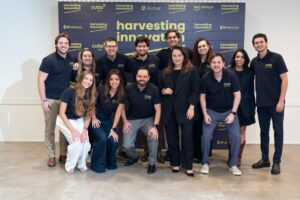GROW, a UK agtech business plan competition, is accepting expressions of interest for its second year in action. Organized by Agri-Tech East, a cluster organization for the sector, the competition is designed to foster entrepreneurship in the food and agriculture technology sector. The ultimate goal of the competition is to turn some of these entrepreneurial ideas into businesses that will be founded and grown in the East of England.
“Agriculture is under massive pressure from a number of angles—commodity prices, extreme weather patterns, etc.—and we believe adoption of appropriate technologies can be an important way to help farmers manage those challenges and increase their resilience,” Dr. Belinda Clarke, director of Agri-Tech East, told AgFunderNews.
Applicants must register an expression of interest by March 7, 2016, and submit a 12-page business plan by April 29, 2016. After filing an expression of interest, each entrant will be paired with a mentor who will help them develop an agtech-focused business plan. The mentors consist of a wide variety of industry professionals with expansive networks of contacts, according to Clarke.
As agtech continues to play an increasing role in tech competitions around the globe, GROW aims to make contestants focus on the technical aspects of bringing their ideas to market, with the requirement that they submit a business plan.
“Agri-tech is an area of huge interest to [investors] at present, especially in the context of pressing global challenges of nutritional security, population growth, and climate change,” explained Clarke. “There are some exciting investments happening internationally in this sector and we are keen to help find the new businesses for future investment.”
After the business plans are submitted, a panel of experts will select a handful of plans to enter the final round on June 22, 2016. The panel includes Angel of the Year 2014 Peter Cowley and AB Sugar head of agriculture Simon Bowen. Finalists will make a 10-minute presentation and field questions from the panel.
“The judges are looking for a great idea, with evidence of a market need, plus an individual or team with ambition, drive, and commitment to bring it to market,” said Clarke. There are seven criteria for scoring each finalist: quality of innovation, commercial feasibility and market assessment, potential route-to-market, protection of IP and know-how, quality of the management team, financial projections and assumptions, and clarity/quality of the plan.
Although the competition does not focus on any particular types of technology, Clarke says the panel will keep an eye out for ideas that increase productivity, profitability, or sustainability.
The winner will receive a cash prize of £1000 and the option to take advantage of additional business support services, including six months free office space, access to the Green Inc incubator at the Future Business Centre of Cambridge, legal advice, and memberships to other entrepreneurial and British-focused networks.
Clarke and the rest of the team overseeing GROW have made a few tweaks based on their observations during the competition’s first round in 2015.
“GROW attracted an eclectic set of ideas, ranging from a computational genetics platform to speed up plant breeding to an on-farm water management system, and from a broad range of people, including scientists, farmers, and people from other sectors with transferable ideas,” said Clarke. As a result, the competition will be more open-minded this year regarding the types of plans that it receives while providing more coaching and pitching support for the finalists.
A bevy of partners is also signing up for the 2016 event, including the University of Cambridge’s department of engineering, general services British farm cooperative FramFarmers, and UK agricultural purchasing group Anglia Farmers
Last year’s winner, AgriTopics, focused on providing a solution to what it saw as the growing global demand for gluten-free products, including protein bars and an existing high-value retail chain. The company advanced white pea flour as a prime ingredient for gluten-free foods. Grown in the UK, white peas also show promise when it comes to improving soil quality, benefiting both growers and consumers.
Other finalists included data management software maker B&C Farming, intensive composting odor buster developer Virok Systems, and biogas company Diesel Dynamics. A software platform designed to help plant breeders make sense of multiple data sets was also among the finalists.
“I’m keen to see European investors make the kinds of investments we are seeing in the US,” said Clarke. “It has taken a while for some of the non-agri-tech investors to start to see the opportunities in the sector, particularly in Europe.” One of the first sectors where Clarke is seeing this growing interest is big data, which has already encouraged some software and computer engineering companies to look at opportunities in agriculture.
“I am hopeful that this high-technology edge will appeal to investors who may not have a current interest in life science, and encourage them to engage with the agri-tech agenda,” she added.
Have news, tips or want to write a guest post? Email [email protected]





